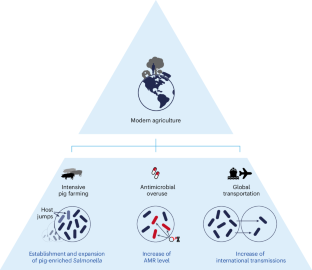We provide evidence that intensive industrialization over the past century, particularly of the livestock trade, has facilitated host jumps and accumulation of antimicrobial resistance genes in Salmonella enterica, leading to the global transmission of this pathogen from Europe and the USA during the height of pork production.
This is a preview of subscription content, access via your institution
Access options
Access Nature and 54 other Nature Portfolio journals
Get Nature+, our best-value online-access subscription
$29.99 / 30 days
cancel any time
Subscribe to this journal
Receive 12 digital issues and online access to articles
$119.00 per year
only $9.92 per issue
Buy this article
- Purchase on Springer Link
- Instant access to full article PDF
Prices may be subject to local taxes which are calculated during checkout

References
Woods, A. Rethinking the history of modern agriculture: British pig production, c.1910–65. 20 Century Br. Hist. 23, 165–191 (2012). This paper reviews the early development of modern pig industrial farming in the UK.
Bonardi, S. Salmonella in the pork production chain and its impact on human health in the European Union. Epidemiol. Infect. 145, 1513–1526 (2017). This paper reports associations between salmonellosis and the consumption of raw or undercooked pork and pork products.
Zhou, Z. et al. The EnteroBase user’s guide, with case studies on Salmonella transmissions, Yersinia pestis phylogeny, and Escherichia core genomic diversity. Genome Res. 30, 138–152 (2020). This paper introduced EnteroBase, a large-scale genotyping database hosting more than a million genomes encompassing hundreds of bacterial species.
Zhou, Z. et al. Pan-genome analysis of ancient and modern Salmonella enterica demonstrates genomic stability of the invasive Para C lineage for millennia. Curr. Biol. 28, 2420–2428.e10 (2018). This paper reports the host jumps of serovars Paratyphi C and Choleraesuis facilitated by pig domestication in Europe.
Thorpe, H. A. et al. Repeated out-of-Africa expansions of Helicobacter pylori driven by replacement of deleterious mutations. Nat. Commun. 13, 6842 (2022). This paper reports repeated out-of-Africa expansions of the causative agent of gastric ulcers, Helicobacter pylori, driven by human migrations.
Additional information
Publisher’s note Springer Nature remains neutral with regard to jurisdictional claims in published maps and institutional affiliations.
This is a summary of: Li, H. et al. Centralized industrialization of pork in Europe and America contributes to the global spread of Salmonella enterica. Nat. Food https://doi.org/10.1038/s43016-024-00968-1 (2024).
Rights and permissions
About this article
Cite this article
Global spread of Salmonella enterica due to centralized industrialization of pig farming. Nat Food 5, 363–364 (2024). https://doi.org/10.1038/s43016-024-00969-0
Published:
Issue Date:
DOI: https://doi.org/10.1038/s43016-024-00969-0
